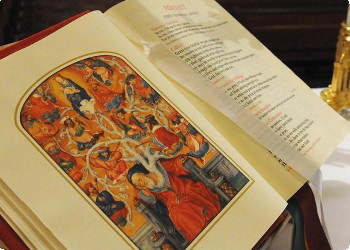A prophet is not without honor except in his native place
2 AUGUST (Mt 13,54-58)
When the thought of a man transforms and twists the mind of God, it is the end of truth and faith. Today, Jesus is in his own country, he teaches in their synagogue, people remain amazed at his teaching. They listen to words that in the opinion of all are unworkable, not in themselves, not in God and for Him, but in the person of Jesus. This cannot be what he claims to be. He speaks well, acts well, he also performs miracles, but these things belong to the prophet, not the Messiah. The Messiah is of a different nature, dough and mold. The Messiah is of royal blood.
Jesus is not of royal blood. His father is a carpenter. His mother is the poorest and smallest woman in the city. Even the relatives of Jesus are simple, poor and little people. His history attests that it is not from this family that the Messiah of the Lord might rise. In relation to his poverty, simplicity, humility, wisdom and gifts of grace are seen as disproportionate, almost incomprehensible, a prodigy out of all rules. When the mind closes to the historical reality these things always happen.
While the Evangelists Matthew and Mark do not report what happened in the synagogue at Nazareth, Luke reveals it to us in every detail. For Jesus it was a true experience of rejection by his people. They even wanted to kill him.
Jesus returned to Galilee in the power of the Spirit, and news of him spread throughout the whole region. He taught in their synagogues and was praised by all. He came to Nazareth, where he had grown up, and went according to his custom into the synagogue on the Sabbath day. He stood up to read and was handed a scroll of the prophet Isaiah. He unrolled the scroll and found the passage where it was written: “The Spirit of the Lord is upon me, because he has anointed me to bring glad tidings to the poor. He has sent me to proclaim liberty to captives and recovery of sight to the blind, to let the oppressed go free, and to proclaim a year acceptable to the Lord.” Rolling up the scroll, he handed it back to the attendant and sat down, and the eyes of all in the synagogue looked intently at him. He said to them, “Today this scripture passage is fulfilled in your hearing.”
And all spoke highly of him and were amazed at the gracious words that came from his mouth. They also asked, “Isn’t this the son of Joseph?” He said to them, “Surely you will quote me this proverb, ‘Physician, cure yourself,’ and say, ‘Do here in your native place the things that we heard were done in Capernaum.'” And he said, “Amen, I say to you, no prophet is accepted in his own native place. Indeed, I tell you, there were many widows in Israel in the days of Elijah when the sky was closed for three and a half years and a severe famine spread over the entire land. It was to none of these that Elijah was sent, but only to a widow in Zarephath in the land of Sidon. Again, there were many lepers in Israel during the time of Elisha the prophet; yet not one of them was cleansed, but only Naaman the Syrian.” When the people in the synagogue heard this, they were all filled with fury. They rose up, drove him out of the town, and led him to the brow of the hill on which their town had been built, to hurl him down headlong. But he passed through the midst of them and went away (Lk 4, 14-30).
It is difficult to open up to the thought of God. It is impossible to accept it when history seems to contradict it. For us not to move from truth to falsehood, error, rejection, what is the principle that we must always observe? When there is no contradiction with the sound morality of the Law, the revelation is welcomed, however, then its fulfillment is waited for in history. Who is morally healthy is always worthy to be listened to.
He came to his native place and taught the people in their synagogue. They were astonished and said, “Where did this man get such wisdom and mighty deeds? Is he not the carpenter’s son? Is not his mother named Mary and his brothers James, Joseph, Simon, and Judas? Are not his sisters all with us? Where did this man get all this?” And they took offense at him. But Jesus said to them, “A prophet is not without honor except in his native place and in his own house.” And he did not work many mighty deeds there because of their lack of faith.
Sound morality always produces healthy fruit. They are fruits that attest to the truth of a person. The fruit can be immediate or even in time. Waiting is required.
Virgin Mary, Mother of the Redemption, Angels and Saints make us of sound discernment.





